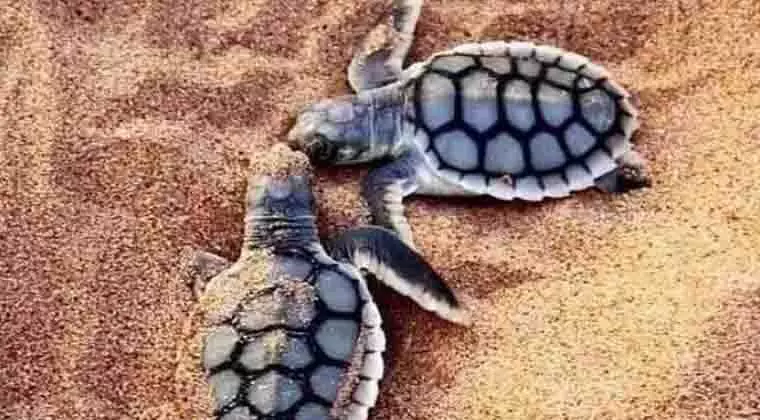Yes, ducks do eat turtles. Ducks are omnivorous animals which means they feed on both plant and animal matter. This includes aquatic vegetation, small insects, fish, amphibians like frogs and salamanders, etc., as well as other water creatures such as turtle eggs and hatchlings or adult turtles.
Ducks have been known to eat soft-shelled turtles if they can catch them; their bills are strong enough to break the shells of these prey items. Additionally, some species of ducks may also consume carrion (dead animals) which could include dead turtles too in certain cases.
What Do Ducks Eat?
Ducks are omnivores, meaning they eat both plants and animals. In the wild, ducks feed on aquatic vegetation such as algae, duckweed, and pondweeds; insects like beetles, grasshoppers, dragonflies, and their larvae; mollusks like snails and clams; crustaceans such as crayfish; amphibians like frogs and salamanders; fish eggs; small fish; grains like wheat or oats; berries such as raspberries or blueberries; seeds from weeds or other plants; plus some scavenged scraps of human food.
Can Turtle And Duck Live Together?
It is certainly possible for turtles and ducks to live together. Ducks are social animals that enjoy the company of other birds, so if you provide your pet turtle with a few feathered friends, it can be an enjoyable experience for all involved. However, there are a few things to keep in mind before attempting such a pairing.
For starters, turtles should never be housed with larger or more aggressive birds like geese or swans as they could easily become injured or stressed out by their presence. Turtles also require access to land as well as water – something many types of ducks do not have onboard their habitats! Finally, remember that while it’s possible for these two species to coexist peacefully under certain circumstances, they will likely not interact much beyond simply occupying the same space due to differences in behavior and preferences.
With proper care and attention though you can create an environment where both your turtle and duck (or ducks!) can thrive!
Do Any Birds Eat Turtles?
Yes, some birds do eat turtles. There are a few species of birds that have been known to consume turtles including hawks, eagles, and vultures. Hawks will target small or young turtles while larger raptors such as bald eagles or golden eagles may target medium-sized adult turtles in order to satisfy their hunger.
Vultures will scavenge carcasses from the remains of deceased turtles and can also feed on eggs laid by female sea turtle species during nesting season. The way these predatory birds attack is usually quite swift; they swoop down quickly with talons outstretched and grab whatever prey item is available before retreating back into the sky for consumption elsewhere. While it’s not common for a bird to hunt an individual turtle outright, if there are multiple small ones present then this situation could occur more frequently than expected.
Turtles represent an important food source for certain types of avian predators in particular regions so understanding their ecology helps us better understand how our ecosystems function together as a whole!
Are Turtles Predators to Ducks?
Turtles are primarily omnivorous and scavengers, so they don’t typically hunt ducks for food. However, some species of turtles are known to be opportunistic predators and may eat duck eggs or young ducklings if given the chance. The majority of wild turtles feed on aquatic vegetation such as weeds, algae, insects, and even fish in addition to carrion (dead animals).
In captivity, it is common for pet turtle owners to provide their pets with live prey such as mealworms or crickets which could include small ducks. So while turtles might not actively look for ducks as a source of food in nature, there certainly is potential that it could occur under certain circumstances depending on the type of turtle involved.
What Animal Can a Duck Eat?
Ducks are omnivores, so they can eat a variety of different animals. Insects such as flies and beetles make up the bulk of their diet and provide essential protein for nutrition. They will also consume worms, slugs, snails, crayfish, and other aquatic invertebrates.
Small fish like minnows are also part of their regular food intake along with frogs, tadpoles, salamanders, and newts. Ducks may even occasionally hunt small mammals like mice or voles if they have access to them in an area where they live or feed in large numbers. Vegetable matter is often eaten by ducks as well including pondweed and other aquatic plants plus wild grasses around ponds or lakesides.
Wow He is Watching Her This Turtle is Watching This Duck Taking a Shower Cleaning
Conclusion
This blog post has provided information about whether or not ducks eat turtles. It appears that the answer to this question is no, as ducks primarily feed on seeds and other aquatic vegetation. Turtles can be a potential food source for some species of duck, but it is not something they actively seek out.
Ultimately, while there are exceptions to every rule when it comes to animal behavior in the wild, we can confidently say that ducks do not usually eat turtles.
